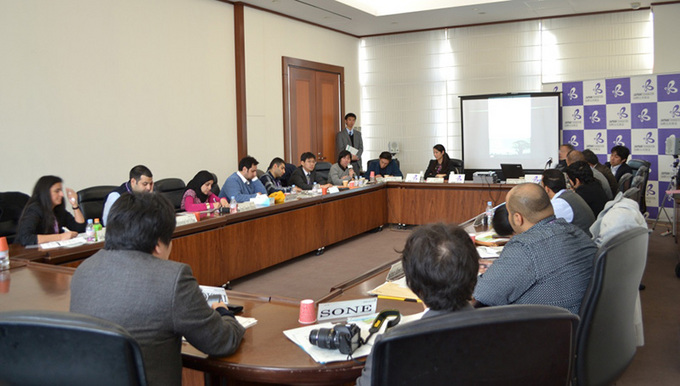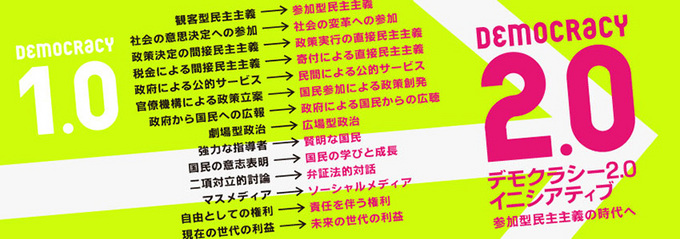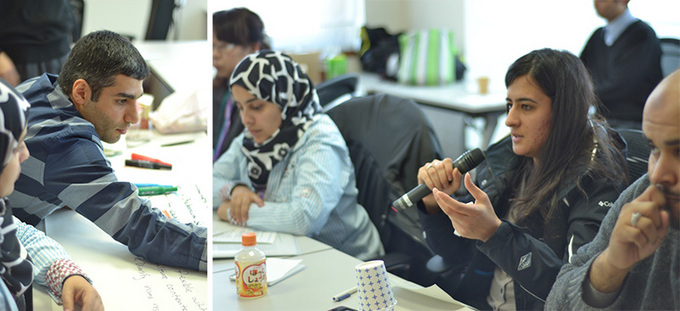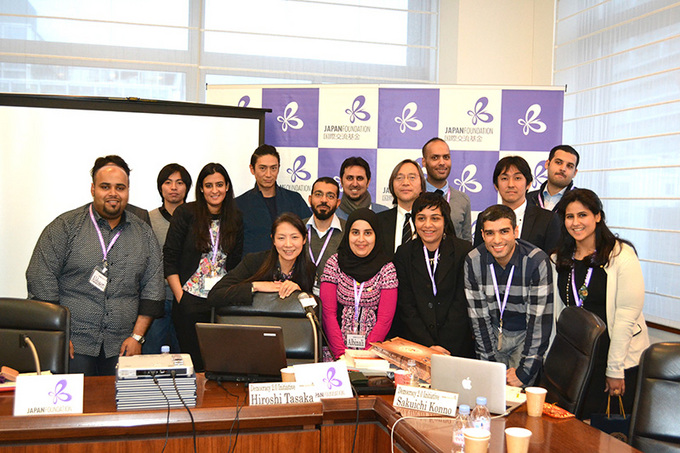Redesigning a Community and Society through Creative Solutions to Social Issues
Hiroshi Tasaka
Representative of the Democracy 2.0 Initiative
The significance of social connections such as "Bonds" or "Ties" in a society, which became a focus of attention following the devastating East Japan Earthquake, has been brought back into the spotlight all over the world. In Gulf nations (countries of the Cooperation Council for the Arab States of the Gulf; GCC countries), rapid urbanization for a last few decades has brought an increase of an individualistic and cosmopolitan life style in particular large families. It would be an urgent and important matter to find out the way to make a balance along with the environmental changes.
How is it possible to realize a society with strong ties?
Or, what can be done to strengthen bonds in society without infringing upon individual rights and freedoms?
In February 2013 the Japan Foundation invited 10 next generation leaders aged 25 to 39, from Kuwait and Bahrain to Japan. These young intellectuals were members of media, royalty, or NGO/NPOs, as well as artists, government officials, and researchers, with the power to attract people and communicate ideas, and they participated in a passionate discussion with the members of the Democracy 2.0 Initiative, including Professor Hiroshi Tasaka of Tama University Graduate School, Kumi Fujisawa of Think Tank SophiaBank, Yusuke Iseya of Crowd Government Lab., Sakuichi Konno of the Japan School of Policy Making, and Kensuke Harada of YouthCreate.
(Record of the discussion at the Japan Foundation on February 5, 2013)
Where is capitalism going?
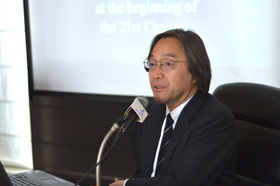 TASAKA: I, like Ms. Fujisawa, have been attending the Davos meetings (the World Economic Forum; an annual meeting held in the Swiss resort of Davos, attended by top global economists, business leaders, scholars, and politicians), but one thing we have been rather disappointed in is that they have been unable to project clear post-Lehman Shock (global recession of 2008) visions for capitalism. Today, we are gathered here to discuss the future of democracy, but I feel we first need to talk about the future of capitalism.
TASAKA: I, like Ms. Fujisawa, have been attending the Davos meetings (the World Economic Forum; an annual meeting held in the Swiss resort of Davos, attended by top global economists, business leaders, scholars, and politicians), but one thing we have been rather disappointed in is that they have been unable to project clear post-Lehman Shock (global recession of 2008) visions for capitalism. Today, we are gathered here to discuss the future of democracy, but I feel we first need to talk about the future of capitalism.
Capitalism needs to mature in order to overcome its disarray. So, then the question is, what is mature capitalism? To answer this, we should ask ourselves: what is a mature spirit?
The mature spirit is able to see values that are invisible to the eye, and with this sprit, we can appreciate intangible values such as knowledge, relationships, trust, reputation, culture, and empathy. If so, mature capitalism should be something that values "intangible capital."
So, what is "intangible capital"? Clues actually lie in many of the words and phrases that have been traditionally passed down in Japan, such as "Sannin yoreba monju no chie (Two heads are better than one)" (knowledge capital), "En (ties)" (relation capital), "Furi o owazu (Don't chase easy money)" (trust capital), "Sekensama (society in terms of what people think of you)" (brand capital), "Okagesama (thanks to)" (culture capital), and "Omotenashi (hospitality)" (empathy capital). Unfortunately, I do feel that perhaps the Japanese themselves are beginning to forget the importance of these intangible values and assets.
Arab young leader: You pointed out the problem with capitalism, but is it possible for Japan to take the lead in presenting a new paradigm as a solution to this issue?
TASAKA: I hope we can show the world how Japan has placed importance on the ideas, spirit, and culture of Japanese style capitalism or Japanese style management; in other words, how we value intangible assets and values.
Arab young leader: We understand that the new cultures, industries, and pop culture in Japan were born as a result of the various efforts in the circumstances after the war. I believe that perhaps bringing something new and different into old values can restore vitality for the future, but what do you think of this idea? Furthermore, what process would you expect this to involve?
TASAKA: I believe that the world we live in today progresses and develops based on a dialectic spiral. Progress is made as if climbing a spiral stairway: if you look at it from the side, you can see you're climbing, making progress and developing, but if you look from above, you're going full circle and returning to the same place. In other words, old and nostalgic things are revived and make a comeback. At the same time, since it is a spiral staircase, you always come back a step higher, meaning that the old and nostalgic qualities are revived with a new value; that is the rule of this world. Therefore, I believe old and nostalgic Japanese values will merge with new ideas, transforming into a new one.
Arab young leader: Simply put, what do you think are the good and bad points of Japanese capitalism?
TASAKA: One of the drawbacks would be the loss of true professionalism. I believe true professionalism gives a sense of job satisfaction; hones one's skills; and develops oneself as a human being. I think there are very few business people now who place importance on these values. The Japanese also tend to feel uncomfortable with the idea of competition. Needless to say, the notion of living your life or professional life for the sole purpose of winning against opponents would be shallow, but in Japan, we have always had the more profound idea of mutual growth through competition, represented in words like "sessa takuma (friendly rivalry)" and "koutekishu (worthy adversary)," and so I believe we should value these ideas.
Meanwhile, a good point would be that the Japanese have the culture of pouring our hearts into monozukuri, or making things. Japan has a reputation for being a monozukuri country, but I believe that what makes Japanese monozukuri outstanding is how it manages to incorporate the heart of hospitality in its technology, products, and services. Without this, I don't think Japan can hope to recover as a monozukuri country in the future.
Arab young leader: While the world is changing in many ways, the system still exists where we have capitalism on one hand and socialism on the other. What do you think of these two ideas mixing and producing a new economic paradigm?
TASAKA: Another rule in dialectic discussion is the idea of mutual penetration of polar opposites, where two opposing things become similar through conflict and competition.
In fact, historically, the opposing thoughts of capitalism and socialism have learned from each other and seen mutual penetration. While capitalism has succeeded in incorporating the socialist idea of social welfare, many socialist countries were unable to incorporate the capitalist principle of competition, and that led to the collapse of the Soviet Union and the Eastern bloc. But now, despite being socialist countries, China and Vietnam have managed to incorporate the good side of capitalism to achieve economic development. Therefore, I believe the world is heading towards a system that can provide a more mature social welfare that socialism aspires to, while also employing the competition principle of capitalism.
At the same time, there will be a mutual penetration for how companies should be. That is, instead of the opposing concepts of profit-making companies versus non-profit organizations, the two will undergo a mutual penetration to create "social enterprises." This will be a new vision for company organizations, merging social contribution and profit-making.
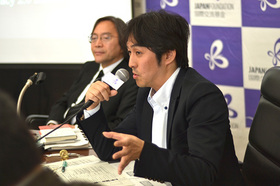 KONNO: I think we can call the situation we currently face "Capitalism 3.0." As Mr. Tasaka said, Capitalism 2.0 is about incorporating the best parts of both socialism and capitalism, and hence is the phase of picking the best of the public sector and business sector. But I believe Capitalism 3.0 is the phase of "intangible capitalism" as we talked about just now, where the non-profit sector emerges as a third player in addition to the public and business sectors, and where these three help each other. In short, it's a stage where money is not the solution to everything. The non-profit sector is about activities and actions that do not involve money, which is indeed intangible, and therefore the new capitalism. I believe Japan should take the lead in building that kind of new capitalism, and that is what we are aiming for. Thus, the Japanese, with our culture and ideas as mentioned earlier, are in a unique position to take the initiative and push this Capitalism 3.0 forward.
KONNO: I think we can call the situation we currently face "Capitalism 3.0." As Mr. Tasaka said, Capitalism 2.0 is about incorporating the best parts of both socialism and capitalism, and hence is the phase of picking the best of the public sector and business sector. But I believe Capitalism 3.0 is the phase of "intangible capitalism" as we talked about just now, where the non-profit sector emerges as a third player in addition to the public and business sectors, and where these three help each other. In short, it's a stage where money is not the solution to everything. The non-profit sector is about activities and actions that do not involve money, which is indeed intangible, and therefore the new capitalism. I believe Japan should take the lead in building that kind of new capitalism, and that is what we are aiming for. Thus, the Japanese, with our culture and ideas as mentioned earlier, are in a unique position to take the initiative and push this Capitalism 3.0 forward.
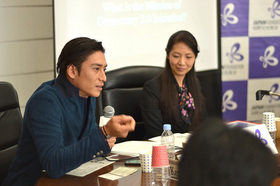 ISEYA: I'm an artist, so I believe that managing my own company is also a kind of art form to achieve my ideals. I want the world to be a place where each one of us can achieve our dreams. Each of us has a purpose in this world and we need to think about what we can do. I believe this is the most important thing to be taught. My ideal is for the earth and society to coexist in a sustainable manner, for all seven billion people all over the world to reflect on that, and for each and every one of us to have the freedom and obligation to think about it. I believe that creating such an environment will enable future growth.
ISEYA: I'm an artist, so I believe that managing my own company is also a kind of art form to achieve my ideals. I want the world to be a place where each one of us can achieve our dreams. Each of us has a purpose in this world and we need to think about what we can do. I believe this is the most important thing to be taught. My ideal is for the earth and society to coexist in a sustainable manner, for all seven billion people all over the world to reflect on that, and for each and every one of us to have the freedom and obligation to think about it. I believe that creating such an environment will enable future growth.
Arab young leader: The Japanese economy grew rapidly after World War II and made a dramatic recovery in the post-war era. But why are you unable to repeat that experience now?
TASAKA: I think one's outlook on life is determined at a profound level when hitting rock bottom, and the same applies to nations. The generation of Japanese who lived through WWII, facing life or death situations, were tough, completely different from the people who grew up after the war. I think education has a lot to do with this, too.
ISEYA: Maybe the prevailing attitude of "somebody else will do it for you" has something to do with it, too. People don't think for themselves because they think they're protected. That's why I believe it's important to establish the concept of Government 2.0 where everybody is accountable for their own lives.
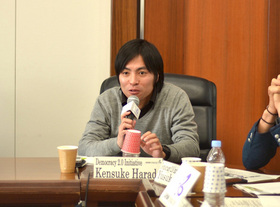 HARADA: Today, unlike the post-war era, there are established parties with interests, and most people believe that these can't be changed. Meanwhile, since those parties reckon they can get away with it, they aren't trying to make the economy better if it involves rocking the boat and changing everything. That's why the young people need to work together and make change happen. Japan cannot recover just by depending on the powers that be.
HARADA: Today, unlike the post-war era, there are established parties with interests, and most people believe that these can't be changed. Meanwhile, since those parties reckon they can get away with it, they aren't trying to make the economy better if it involves rocking the boat and changing everything. That's why the young people need to work together and make change happen. Japan cannot recover just by depending on the powers that be.
Arab young leader: Why can't Japan change?
KONNO: In terms of the four perspectives of east-west, north-south, religion, and military industry, Japan has the advantage of being able to take a neutral position, but the Japanese might have forgotten how valuable that is. I think we should try remembering that.
Arab young leader: I have a question for Mr. Iseya. You said you believed the government should be smaller. But in the United States, the smaller government and free market mechanism led to things going out of control, triggering the economic crisis. What are your thoughts on this? Moreover, I believe that regulations can sometimes be an effective solution. What do you think of this?
ISEYA: I was talking about the situation in Japan. I believe there's a chance to implement Government 2.0 in regional politics. So, to do so, I think every one of us must learn and grow, and we are currently in the middle of that process.
TASAKA: Ever since the Lehman Shock, people have argued whether we should strengthen regulations or protect free competition. But I think we're forgetting the importance of the third alternative, which is self-regulation; in other words, the importance of ethics. This idea of refraining from doing something, not because it's illegal but because it goes against ethical standards, is a piece of old wisdom that is being lost all over the world today.
Arab young leader: I'd like to ask Mr. Tasaka about the concept of curing capitalism with capitalism. It seems like a paradox, but why does Japan cling to capitalism? Is capitalism the true answer?
TASAKA: The internet revolution is starting to change the economic principles of capitalism at the fundamental level. The internet has allowed the "voluntary economy" (an economy whose objective is the provision of goods and services through goodwill or good intent instead of the acquisition of money) to make a tremendously strong comeback. As with the development of Linux, the voluntary economy has produced wonderful values, and it is based on the movement of "intangible capital," such as knowledge, relation, trust, brand, and culture. The internet-induced revival of the voluntary economy will probably produce a new form of capitalism that should be called "intangible capitalism." That is why I have great faith that capitalism itself will make a fundamental transformation.
What is Democracy 2.0 hoping to achieve?
TASAKA: Now, I'd like to talk about the future of democracy. I believe that democracy will see 14 paradigm shifts in the future.
Number one is the paradigm shift from "audience democracy" to "participatory democracy."
Number two is the paradigm shift from "participation in social decision-making" to "participation in social reforms."
Number three is the paradigm shift from "public services by the government" to "public services by the private sector."
Number four is the paradigm shift from the "indirect democracy of policy making" to "direct democracy of policy implementation."
Number five is the paradigm shift from the "indirect democracy of taxation" to "direct democracy of donations."
Number six is the paradigm shift from "policy planning by the bureaucracy" to "policy creation by citizen participation."
Number seven is the paradigm shift from "the government making announcements to the people" to "the government listening to the people."
Number eight is the paradigm shift from "theatrical politics" to "plaza politics."
Number nine is the paradigm shift from "strong leaders" to "wise people."
Number ten is the paradigm shift from "people making statements" to "people learning and growing."
Number eleven is the paradigm shift from "dichotomy" to "dialectic dialog."
Number twelve is the paradigm shift from "mass media" to "social media."
Number thirteen is the paradigm shift from "rights as freedom" to "rights with responsibility."
Number fourteen is the paradigm shift from "for the present generation" to "for the future generation."
Arab young leader: How can the shift from audience politics to participatory politics be achieved?
TASAKA: The Japanese have tools such as the internet to realize participatory politics, but I don't think they have the culture to use that yet. That is something we need to work on.
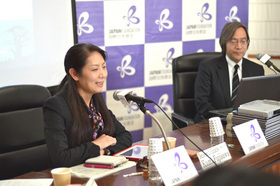 FUJISAWA: To add a word, there are two points to be raised regarding audience politics. The first is that we have the right to vote but voting rates are low. I think this is an indication that there exists a line between the stage and the audience. The second point is that though becoming engaged in politics involves taking responsibility and suffering consequences, when you look at Japan today, people hope the system will change with only the politicians feeling pain and not the people.
FUJISAWA: To add a word, there are two points to be raised regarding audience politics. The first is that we have the right to vote but voting rates are low. I think this is an indication that there exists a line between the stage and the audience. The second point is that though becoming engaged in politics involves taking responsibility and suffering consequences, when you look at Japan today, people hope the system will change with only the politicians feeling pain and not the people.
Therefore, the reality is that politicians are acting like stage producers, only interested in how to please the audience and win their support. The Democracy 2.0 Initiative is engaged in specific activities to create a society where all members, including politicians and the people, are the actors, audience, and producer.
Arab young leader: We are seeing the world of 1970s and 1980s American cinema coming to life in our lifestyles today. Do you think there's the possibility that the Japanese film industry will do the same?
ISEYA: Regardless of whether it's filmmaking or business management, I think the important thing is to have a strong sense of purpose when presenting something to the world. Filmmakers need to think about what they present, what their ideals are, and how to communicate their aim or process through their work. It is necessary for creators or business managers to really have ideals about what they want to do.
FUJISAWA: I have a friend making animation films that are screened worldwide. I asked him what type of film interests audiences abroad, and he replied, "Definitely the ones that involve the cultural and spiritual values that have been passed down from generation to generation in Japan." In other words, the 20th century painted the future in visible images. But the 21st century will be about discovering intangible values in films. I believe Japanese films provide intangible values that are needed for the future.
TASAKA: Today's discussion on the issues of democracy and capitalism was very meaningful. As I mentioned in the beginning, there is something I have felt as attending the Davos meetings for so many years. Though they are an opportunity for the world's top leaders to congregate, the discussions are still centered on European and American values. The Lehman Shock and Euro crisis are a clear indication that the current democracy and capitalism are hitting a wall, and we are yet to see new ideas that would help fundamental change. I feel we're reaching limitations in that sense. Therefore, I believe it will be the people of countries other than the United States or Europe who will discover the pathway to a new capitalism or democracy for the world. I hope the Gulf states members here today will open up its new paths while valuing traditional culture and ideas, too. And for us in Japan, I hope we will also find its new paradigms and present them to the world.
Participants
[Japan]
Hiroshi Tasaka
Representative of the Democracy 2.0 Initiative
https://twitter.com/hiroshitasaka
Kumi Fujisawa
Co-founder of Think Tank SophiaBank
https://twitter.com/kumifujisawa
Yusuke Iseya
Crowd Government Lab.
https://twitter.com/Iseya_Yusuke
Sakuichi Konno
Managing Director of Japan School of Policy Making
https://twitter.com/s1konno
Kensuke Harada
President of YouthCreate
https://twitter.com/haraken0814
Democracy 2.0 Initiative Facebook page
https://www.facebook.com/democracy2
About the Democracy 2.0 Initiative
https://www.facebook.com/democracy2/app_198030890240593
[Kuwait]
Alanoud Ebraheem Al-Sabah
International Relations Department of Kuwait national Security Bureau
A member of the ruling family of Kuwait and next generation woman leader.
Faisal Ali Al Sabah
Specialist of the Kuwait Petroleum Corporation for the Government and Parliament
Abdulwahab Aref Al-Essa
TV Anchorman at Alwatan TV
Host on a political talk show and other programs with major influence, with over 150,000 Twitter followers.
Monira M.E.A.Y. Al-Qadiri
Artist
Artist in residence in Lebanon. PhD from Tokyo University of the Arts in Japan.
Saad Sultan Alotaibi
Police officer and creator
Police officer, but also a creator, graphic design teacher, author, and TV commercial planner.
[Bahrain]
Ahmed Abdulla Bucheeri
Assistant Professor of Engineering Department, University of Bahrain
Assistant Professor at the sole national university in Bahrain. PhD from Ibaraki University Graduate School of Science and Engineering and former researcher at the Japan Atomic Energy Agency.
Salman Ahmed Aldoseri
Chief Business Performance Section, Civil Service Bureau
Specialist at the government agency playing an active role for adoption, better treatment, and development skill of administrative officer.
Ahmed Fouad Alansari
Editor and Proofreader at Shura Council
Shura Council (similar to Japan's House of Councilors) officer. Also deeply involved in educational programs for children and young adults of various ages.
Layla A. Hameed Albalushi
Youth Activities Specialist, General Organization for Youth and Sports
Specialist at a government agency promoting international youth activities and ability enhancement. Also gives a training program of video production for children at the Youth Innovation Center.
Amal Jassim Albinali
Standards Development Supervisor, Ministry of Industry and Commerce
Officer at the government agency in charge of the measuring technology for various products. Also works at the Youth Innovation Center.
Keywords
- Anime/Manga
- Film
- Science Technology
- Politics
- Economics/Industry
- Social Securities/Social Welfare
- Philosophy/Religion
- History
- Peacebuilding
- Japan
- Kuwait
- Bahrain
- Democracy 2.0 Initiative
- Great East Japan Earthquake
- Cooperation Council for the Arab States of the Gulf
- GCC countries
- Tama University
- Kumi Fujisawa
- Think Tank SophiaBank
- Yusuke Iseya
- Crowd Government Lab.
- Sakuichi Konno
- Japan School of Policy Making
- Kensuke Harada
- YouthCreate
- Capitalism
- Davos meetings
- World Economic Forum
- Lehman Shock
- Democracy
- Socialism
- Hegelian dialectic
- Social Enterprise
- Capitalism 3.0
- Capitalism 2.0
- World War II
- Japan's post-war economic recovery
- Government 2.0
- Internet revolution
- Voluntary economy
- LINUX
- Participatory democracy
- Indirect democracy
- Direct democracy
- Mass media
- Social media
- Euro crisis
Back Issues
- 2025.6. 9 Creating a World Tog…
- 2024.10.25 My Life in Japan, Li…
- 2024.5.24 The 50th Japan Found…
- 2024.5.24 The 50th Japan Found…
- 2024.5. 2 People-to-People Exc…
- 2024.5. 2 People-to-People Exc…
- 2023.12. 7 Movie Theaters aroun…
- 2023.6.16 The 49th Japan Found…
- 2023.4.24 The 49th Japan Found…
- 2022.12.27 Living Together with…


